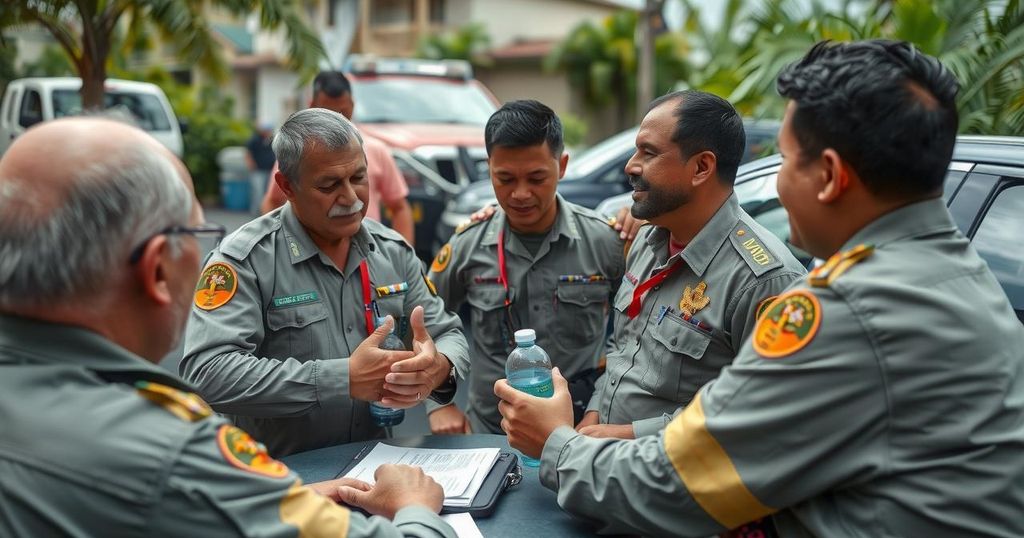UN and International Delegation Discuss Typhoon Response in the Philippines
On December 12, 2024, UN and international representatives met with the Office of Civil Defense in the Philippines to discuss the country’s response to multiple tropical cyclones. The meeting highlighted effective coordination, support from international partners, and the importance of preparedness in humanitarian efforts. The consecutive cyclones severely impacted over 13 million people and caused significant damage, emphasizing the need for a cohesive national response strategy.
On December 12, 2024, the United Nations Philippines Resident Coordinator and Humanitarian Coordinator, Gustavo González, led a delegation consisting of representatives from several nations, including Norway, the European Union, USA, Australia, and the UK, to visit the Office of Civil Defense (OCD) in Manila. The purpose of this visit was to assess and discuss the ongoing typhoon response efforts in light of the recent severe tropical cyclones that struck the Philippines. The delegation toured the OCD Operations Center, which serves as the central hub for managing disaster response initiatives and ensuring efficient coordination among various stakeholders.
González acknowledged the exemplary leadership of the Department of National Defense and the National Disaster Risk Reduction and Management Council (NDRRMC) in effectively responding to the challenges posed by six tropical cyclones in a short span of five weeks, including Typhoons Trami (Kristine), Kong-rey (Leon), Yinxing (Marce), Toraji (Nika), Usagi (Ofel), and Man-yi (Pepito). He stated, “Coordination amongst government institutions, the humanitarian country team, private sector and the traditional friends of the Philippines in addressing the recent series of typhoons has been remarkable.” He emphasized the critical importance of preparedness and anticipatory action in saving lives and conserving essential resources.
During the meeting, the international representatives reiterated their commitment and support for the humanitarian response in the Philippines. Christian Lyster, Ambassador of Norway, noted the nation’s role as a contributor to the Central Emergency Relief Fund (CERF), commending the humanitarian community for its readiness to tackle these challenges. Additionally, Massimo Santoro, EU Ambassador, expressed solidarity and recognition of the resilience he observed since assuming his role.
Ryan Washburn, USAID Mission Director, underscored the longstanding collaborative efforts between the United States and the Philippines in preparing for such natural disasters. Furthermore, Sarah Spencer, First Secretary at the Australian Embassy, praised the Philippine government’s extensive disaster response efforts. Noelle Agudelo, Political Advisor from the UK Embassy, acknowledged the challenges faced and commended the ongoing humanitarian response.
Assistant Secretary Raffy Alejandro and Director Agnes Palacio from the OCD outlined the government’s response strategies and recovery plans for affected communities. They reported that the Humanitarian Needs and Priorities (HNP) plan has secured funding amounting to $22.5 million out of the total requirement of $42.2 million. Asec. Alejandro asserted, “During these challenging times, the Office of Civil Defense is not just responding to the disasters, but it is also preparing our nation to withstand the test of time.”
The consecutive cyclones have had a profound impact on the Philippines, displacing over 2.9 million individuals and damaging approximately 200,000 homes, thus causing significant distress among affected communities and agricultural sectors, with damage costs exceeding $125 million. The dedication to effective coordination and response exemplified during this crisis is vital in maintaining resilience against future calamities.
The article details a significant meeting between high-ranking officials from the United Nations and various countries to discuss the Philippines’ response to a series of tropical cyclones. This gathering underscored the international community’s commitment to supporting the country’s humanitarian efforts during an exceptionally challenging period. By visiting the Office of Civil Defense, the representatives aimed to gain insights into the operational strategies implemented to manage disaster responses effectively and improve collaboration among stakeholders involved in recovery efforts.
In conclusion, the visit by the United Nations and international representatives to the Office of Civil Defense highlights the critical importance of effective coordination in disaster response. The collective efforts to address the challenges posed by the recent tropical cyclones show a commitment to humanitarian aid and empowerment. The emphasis on preparedness and the sharing of resources among nations will undoubtedly aid in enhancing resilience against future natural disasters in the Philippines.
Original Source: reliefweb.int




Post Comment